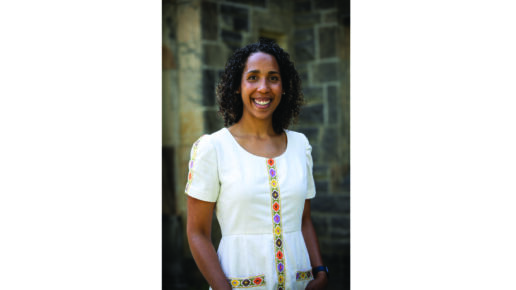Ramata Tarawally, Director of Community Wellness talked to us about the health and wellness of students at Trinity, and the plans for the Wellness program.
1. On the heels of another academic year, can you share a favourite moment from the past year on campus?
RT: Orientation week was really special. There were so many in-person events, including a concert on our back field, and it was wonderful seeing people together and connecting, and not stressed about it. And it wasn’t just first-years—because of the pandemic, many second-, third- and fourth-year students were also discovering new places on campus and meeting fellow students in person for the first time.
Another wonderful memory from this past year was our therapy dog visits. This is the second year we’ve brought them in, usually once a month. Therapy dogs offer a lot of benefits for our students, helping them to relax and destress or cope with homesickness. They can even act as a bridge to help students interact with their peers. Students will pop in on a therapy dog day with a sort of frenetic energy, saying they can only stay for five minutes, but they all end up staying for the entire hour. And many bond not only with the dogs but with their owners, who are for the most part retirees. There have been some beautiful connections formed between these younger students and these older people—for some students they find it easier than with their peers.
2. In-person campus life has returned to Trinity, how have students and your team emerged? In what ways is the Trinity experience in 2023 different for students than it was in 2019?
RT: The pandemic was a gift in terms of teaching us how to serve students better by using different means of reaching out, like Zoom and other online channels. By making our toolbox bigger, we have increased our ability to meet students’ needs, even with the return to greater activity and in-person life on campus.
We’re continuing to help our students understand resilience. They’ve all been through something that was really hard, and reflecting on the skills and capacities they gained as a result will help them deal with future challenges in their lives. Sometimes students forget that.
Students still have a need for support and connection today even though most students no longer see COVID as an emergency. A small niche of students is still very stressed about it, but we are creating an environment of kindness for them and helping them access the mental health supports they need.
3. Although we’ve just wrapped up another academic year, what plans are you most excited about for new and returning students this September? Will new initiatives created during the pandemic, like the Trin101 virtual orientation program, continue?
RT: We learned that virtual orientation throughout the summer is a benefit to all Trinity students. That will continue as a complement to in-person orientation week in the fall, which is always a highlight for everyone.
In 2021 we introduced the Community Wellness Coordinator (CWC) role, which has been really successful. The CWCs are part-time graduate students who live on campus and are on call to support Trinity students. They are an incredible resource and have helped increase the visibility of our Health and Wellness team. As a result, we’ve seen an increase in students accessing our services—students are starting to know we are here for them. One student came to us for support this year after overhearing an interaction between one of our CWCs and another student in her residence, for example.
Our goal next year as the Health and Wellness team is to be as visible as we can early in the year so that students know who we are and know that they can call on us for all kinds of support. Having seen us around on campus definitely helps break down barriers in asking for support and encouraging engagement in our activities.
4. What trends have you noticed in the types of health and wellness supports Trinity students are accessing?
RT: In addition to a general increase in students knocking on our doors and attending our wellness events, I’ve noticed a couple of trends. One is a lot of stress and anxiety related to academics—for some students, shifting from virtual to in-person learning has been difficult and they need support in accessing resources and developing different work habits.
Another trend I’ve witnessed is an increase in disordered eating. Many people experienced a change in their relationship with food during the pandemic. For students who need help we can connect them with the professional therapy and medical care they need through a referral to U of T’s Health and Wellness services.
5. How can alumni connect with and support Trinity’s current students?
RT: One of the best things alumni can do is to donate to Trinity’s student support programs, if they’re able. We know the need is there—the more visible we are as a resource, the more students we’re interacting with through our programs. Honestly, most 19-year-olds don’t need therapy, but many need some help navigating life through some conversations with trusted adults. But those who do need therapy are scared or overwhelmed and they need our support. Many think they don’t deserve help, or that they will not have a choice in how that help is provided to them. We help them understand what therapy is and show them that they drive the process themselves. More than one student has described their experience with our team and with a therapist she worked with through U of T as “life changing.” These are incredibly important realizations to have at a young age, and they are just as important as the academic and social aspects of a student’s Trinity experience.
BONUS QUESTION: We know you’re an avid reader. What’s the best book you’ve read recently?
RT: I always have a few books on the go, and I’ve read some great ones this year. A recent standout is Fresh Water for Flowers, by Valérie Perrin. Such a beautiful book!

